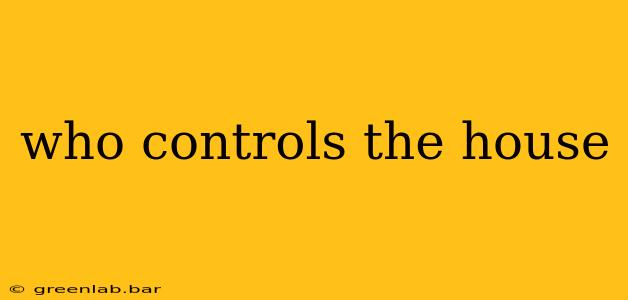Who Controls the House? Navigating Power Dynamics in Domestic Spaces
The question "Who controls the house?" isn't as simple as it sounds. It's a question that delves into complex power dynamics, shifting responsibilities, and deeply ingrained societal expectations. The answer varies wildly depending on family structure, cultural norms, individual personalities, and even the specific day of the week. Let's unpack the layers of this seemingly straightforward query.
The Traditional Model: A Shifting Landscape
Traditionally, many societies have assigned primary control of the household to one individual—often the male head of the family. This model, however, is increasingly outdated and challenged. While some households may still operate under this structure, the reality is far more nuanced. The "control" is often shared, negotiated, or even contested.
Shared Responsibility: The Modern Approach
In many modern households, a more equitable distribution of control is the norm. Partners may share financial responsibilities, childcare, household chores, and decision-making. This collaborative approach requires open communication, mutual respect, and a willingness to compromise. While seemingly ideal, even this model can encounter challenges if responsibilities aren't distributed fairly or if differing expectations clash.
Power Dynamics in Action: Unveiling the Subtleties
Even in seemingly egalitarian households, subtle power dynamics can emerge. These aren't always overt acts of control but rather subtle influences that shape decision-making. For example:
- Financial Control: Who manages the finances? Even in joint accounts, one partner might hold more sway over spending decisions.
- Household Chores: Are chores divided equally, or does one partner shoulder a disproportionate burden? This imbalance can contribute to feelings of resentment and inequity.
- Decision-Making: Who makes the final call on significant purchases, renovations, or family outings? A pattern of one partner consistently making the ultimate decision hints at a power imbalance.
- Emotional Labor: The often-invisible work of managing emotions, communication, and household harmony can fall disproportionately on one individual, impacting their perceived control and agency.
Beyond the Couple: Family and Extended Networks
The dynamics become even more complex when considering extended family members living in the household. Grandparents, adult children, or other relatives may influence decision-making, adding another layer to the question of control. Negotiating shared living spaces requires clear communication and a defined understanding of responsibilities and decision-making processes.
Redefining Control: A Holistic Perspective
Instead of focusing on who controls the house, perhaps a more fruitful question is how control is exercised. A healthy household relies on shared responsibility, open communication, mutual respect, and a willingness to adapt and negotiate. Control, in this context, becomes less about individual dominance and more about collaborative governance. This involves recognizing the individual contributions of each member and valuing their input in creating a harmonious and functional living space.
Ultimately, the answer to "Who controls the house?" is multifaceted and depends on the specific circumstances of each household. Understanding the underlying power dynamics is crucial for fostering a healthy and equitable living environment for everyone involved.

